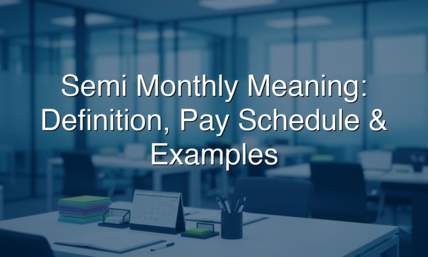Balance Sheet vs Income Statement - What is the Difference?
When you are a business, you want to make sure that everything about your profits or financial situation is ordered and tidy. This is an incredibly important part of the business, and not just for the IRS or for other institutions that would scrutinize your business and what you are doing.
It is important for you, because at the end of the day, you need to know how well or poorly your business is handling its money. The way this is conveyed to you and your accounting team is going to be through a series of reports and recorded transactions.
The problem is that looking at these reports can be jarring and confusing if you have not worked in accountancy for many years. Some of the most valuable reports are the balance sheets and the income statements. But what exactly are these? What do they do? And most importantly, how exactly do they help your business as a whole?
In this article, we will look at balance sheets and income statements closely and inform you of what the differences between them are and how they can help your business.
Also read: What is a Bridge Loan?

What Is a Balance Sheet?
A balance sheet can be described as a quick overview of the current state of a business or a company, in terms of what it owes other businesses or individuals and what it owns in total at that point. In this one sheet, it is going to be a listing of everything that the business owns, how much the assets are worth and the liabilities that the business has incurred.
Basically, the idea is to get all this information about the business in a comprehensive list with all of this information in one place, so that the people within the company can understand it easily. The alternative is that all this information is put into a wall of data and text, which is good for no one.
The main function of a balance sheet is to show the financial position of a business. It is going to be a comprehensive list of everything an organization is worth, as well as what they are currently owed. This can show a lot of information about a business and the state of its finances.
For example, a business that has a lot of assets is likely in a good position, whereas a business with a lot of liabilities will likely have a lot of problems in the future. A business can also learn a lot about itself by seeing the way it is currently run, what it owns and what it owes.
Also read: Can I Pay Off My Mortgage Early?

Purpose of a Balance Sheet
The purpose of a balance sheet is to show how much a business has in assets and how much it owes in liabilities. The decisions that a business makes between its assets and liabilities will affect the overall financial health of the business.
If a business has a lot of assets, it is likely in a good financial position because it can use these assets to sustain the company if it falls into financial trouble. If a business has a lot of liabilities, it means that the business is probably not doing very well.
There are a couple of reasons why a balance sheet is so necessary. Firstly, businesses tend to rely very heavily on outside sources of income to keep it afloat. What we mean by this is that businesses offer something in exchange for monetary gain, should their services no longer be required, or those sources suddenly stop paying, such as a bank cutting off your financing or a recession occurring, the business will be in trouble.
Secondly, the liabilities in this situation are usually not covered by the owners or by anything but the company itself, so they are not actually taking any responsibility for the financial decline in the company should it occur.
If a business is not doing very well financially, it is likely that the owners will consider selling it or shutting it down, which could have a significant effect on the company’s employees’ jobs and their future.
As such, with a regularly produced balance sheet, the people within the business can monitor what exactly is happening and what is likely to happen. This means that a lot of the time, any problems can be foreseen and so steps can be put in place to mitigate any future disasters.
What Is an Income Statement?
An income statement is a record of all the revenue that the company has generated, along with all expenses that the company incurred within a set period. From this mix of revenue and expenses, the net profit of the business is derived.
This profit can then be distributed to the shareholders or reinvested back into the business, depending on the decisions of those who own the business. The income statement can be a key part of your business and is often critical to achieving the financial health that you want.
However, it is important not to get caught up in the minutiae of the numbers and let it overpower you. The most important thing to understand with the income statement is that it is a profit and loss statement overall, not a profit and loss statement by department or worker.
Also read: Did Your Credit Score Drop Off After Paying Off Debt?
Purpose of an Income Statement
When analyzing a company and its value, many investors will look at the income statement. This is because the income statement is going to tell you how much revenue came into the business and how much was spent on expenses.
From this, you can calculate the profit that the company made, which is a key aspect of the financial health of the business. The people in charge of the business will use the income statement to make critical financial decisions and to understand where their money is being made.
Also read: What is the average credit score?
Key Differences Between a Balance Sheet and an Income Statement
The purpose of the two financial reports is different, as is their method of presentation. The balance sheet is a snapshot of the current state of the business, while the income statement is a snapshot of the company’s revenue and expenses. These may seem similar but actually have some surprising differences:
- Time: A balance sheet will show company information for a specific moment in time, while an income statement shows it over a period of time.
- What they report on: A balance sheet will report on assets, equity, and liabilities, while the income statement reports on revenue and expenses.
- Usage: The balance sheet reports on the assets the company has to pay financial requirements, whereas an income statement is used to determine the company’s performance and show financial concerns.
As such, it can clearly be seen that there are many differences between the two reports.
Also read: Proof of Income for a Mortgage

Conclusion
A balance sheet and an income statement appear similar, but only on the surface. In reality, they record different things and are used in different ways. Both are incredibly important to a business and if you want yours to succeed, you need to get to grips with both.
Your check stubs can be a great way for you to keep track of your finances so you can use them as a tool when applying for a loan.















